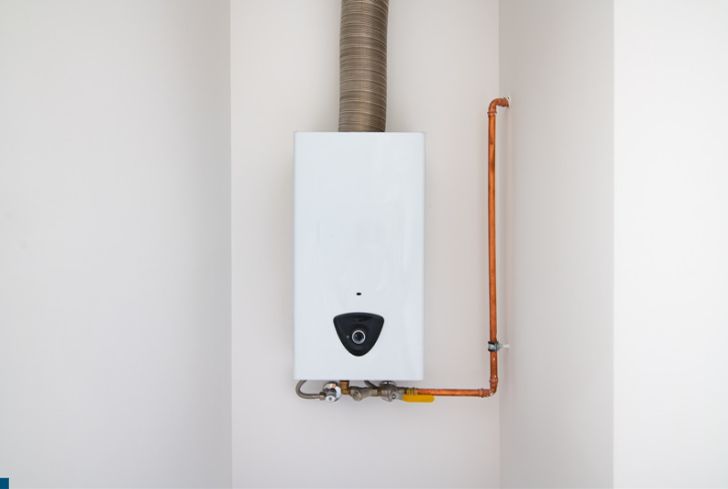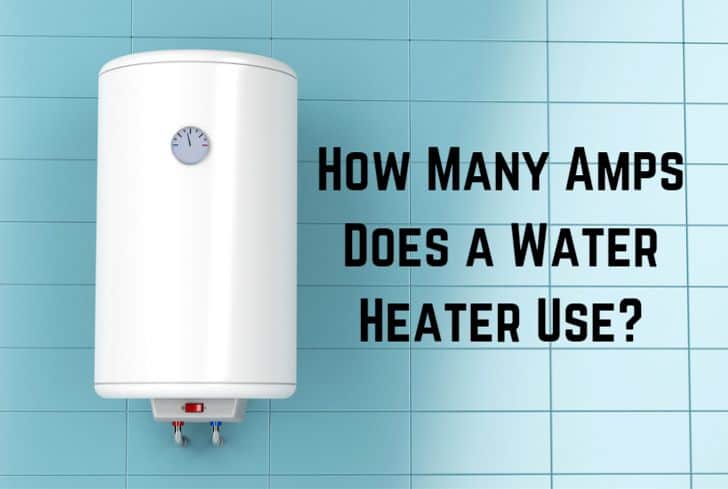Water heaters are an essential part of any home or business. Whether it’s used for cooking, bathing, or laundry, hot water is a necessity. But have you ever wondered just how many amps does a water heater use?
Well, knowing the amperage draw of your water heater can be necessary for a few different reasons. And in this article, we’ll cover everything there’s to disclose about the amperage of water heaters – so you can make the best decision for your needs.
Read: How Many Amps Does a Garbage Disposal Use?
What is the Standard Amperage For an Electric Water Heater?
The standard amperage of an electric water heater is 18.75 amps at 240 volts. The average electric heater comes with a wattage rating of 4500 watts, although this figure may differ from one model to another.
Knowing the amount of electricity that your heater is using can help you as a homeowner to better understand your power bill and how much it costs to operate the appliance. And if you have an average electric heater, you can expect it to use about 20 amps.
But then again, “average” in this case means an electric water tank that comes with a tank, also known as container heaters. If you’re utilizing an electric water heater that doesn’t have a tank, also known as the tankless electric water heater, the amperage will be different.
Mostly, tankless electric water heaters require a slightly higher amperage of 120 to function correctly. But don’t let that scare you; these units only heat the water on demand, so the overall energy consumption is lower than that of a water heater with a tank.
How Many Amps Does a Gas Water Heater Use?
A standard natural gas water heater draws as little as 12 amps at 115 volts, which is significantly lower than the power consumption of an electric version. It’s an ideal solution for those who want to save on their energy bill while still enjoying the benefits of hot water.
Even so, it’s worth mentioning that gas water heaters have a higher upfront cost than their electric counterparts. You can expect to pay 25 to 30% more for a gas water heater, although the lower energy consumption quickly offsets the high price.
When it comes to tankless gas water heaters, the power requirements are a bit higher. Most of these models will need around 120 amps to work correctly. But then, as we said before, tankless water heaters only heat the water when you need it. So, they’re still more energy-efficient than water heaters that come with a tank.
What is the Cost and Energy Consumption of Different Electric Water Heaters?
The cost of your water heater will depend on the wattage of the unit, usage, and energy costs per kilowatt. But on average, you can expect your water heater to claim between $30 to $47 per month, and $353 to $554 annually, assuming you’re using it 2 hours a day.
The table below shows the energy costs of water heaters with different wattages. The calculations assumed that the heater runs 2 hours a day, every day, and that the price per kWh is $0.14.
How To Save On Your Water Heater Energy Costs?
Like with most electrical appliances around the home, you can save on your water heater energy costs by following some simple tips. The difference may not be significant, but every little bit counts, right?
Here are some tips on how to save energy with your water heater:
Go For An Energy Star Model
These models meet or exceed the minimum federal standards for energy efficiency. They use 10-20% less energy than standard models, so they’ll help you save money on your energy bill.
Get The Temperature Setting Right
Most water heaters come set at 140 degrees, but experts say the ideal setting is 120 degrees. So, try and readjust your thermostat, and that will help you save energy without affecting your hot water supply.
Insulate Your Unit
If your water heater is in a colder part of the house, it has to work harder to heat up the water. As such, insulating it will help keep the heat in and make it work more efficiently. Sure, doing this will cost some money, but it will pay for itself in the long run.
Get A Low-Flow Showerhead
Investing in a low-flow showerhead will save you water and energy. Since the water heater won’t have to work as hard to heat up the water, you’ll see a decrease in your energy bill. Just make sure that you don’t choose one whose flow is too low than you’d find comfortable.
Cold-Wash Your Laundry
This one’s a two-for-one tip! Not only will washing your clothes in cold water save you money on your electricity bill, but it will also prevent some clothes from fading. Heat can worsen bleeding, so if you want your clothes to last longer, cold washing is the way to go.
How To Determine the Right Sized Breaker For Your Water Heater
Correctly determining the breaker size is essential since it ensures that your water heater doesn’t overload the circuit. And usually, National Electrical Code (NEC) recommends using a breaker that’s 125% of the appliance’s load.
For instance, if you have a water heater that draws 10 amps, you’ll need a circuit breaker that can support at least 12.5 amps. And since we don’t have one rated at that amperage, the next best option would be a 15-amp breaker.
It’s also worth mentioning that some water heaters come with their own breaker. So, if you’re not sure about the size or amperage, it’s always best to check the manufacturer’s instructions.
What Size Breaker Do I Need For a 3000-Watt Water Heater?
A 3000-watt water heater will need a 20-amp double pole breaker. A 3000-watt heater needs 12.5 amps when connected to a 240-V circuit, so a 20-amp circuit breaker will ensure the circuit is not overloaded.
You see, when using the 125% rule, 12.5A needs a 15.6-amp breaker. But since we don’t have one, the next best option would be a 20A breaker. Of course, a 15-amp would do. But again, remember that you’ll have violated the NEC rule if you choose to go that route.
To be safe, we recommend using a 20A breaker for a 3000-watt water heater. It will guarantee that your appliance is properly protected and won’t overload the circuit.
What Size Breaker Do I Need For a 4500-Watt Water Heater?
A 4500-watt water heater will need a 30A breaker. A 4500-watt heater, which is the standard wattage of electric water heaters, needs 18.75 amps when connected to a 240-V circuit. So, it will require a breaker that’s at least 23.43 amps to comply with the code rule.
But again, since we don’t have one, the next best option would be a 30-amp version. The larger size is even better since it will give you room for error. But again, remember to read the manufacturer’s instructions carefully to see if they have any specific recommendations.
Read: How Many Amps and Watts Does a Vacuum Use?
What Size Breaker For a 40-Gallon Electric Water Heater?
A 40-gallon electric water heater will work well with a 30-amp breaker. And actually, a 30-amp breaker is the most common size. So, chances are you won’t need an electrical system upgrade when using it.
You see, a 40-gallon tank is the standard size for electric heaters. So, if you’re bringing one into an older home, chances are you’re replacing a similar-sized unit. As such, you will likely not need to bring in a new breaker as long as the one you’ve been using has always been working well.

What’s the Correct Wire Size For a Water Heater?
The correct wire size of your water heater depends on the number of amps the water heater needs to draw. Higher amps require a thicker gauge. Otherwise, the wire will overheat and may cause problems for your home’s electrical system or even your appliance.
You see, the right size of wire is a crucial factor when it comes to water heaters. If the wire is too thin, it will overheat and may cause a fire. So, you need to make sure you use the correct wire size to avoid any problems.
The general rule of thumb is that a 30 to 40-amp water heater needs an 8 AWG wire. For a 25 amp heating element, you’ll need a 10 AWG wire. And for a 20 amp water heater, you’ll need 12 AWG wire. In the event you have a tankless water heater whose amperage draw is over 100A, you’ll need to have a licensed electrician do the wiring.
But generally, it’s always best to work with a thicker gauge than what you actually need. It will keep everything cool and won’t present any problems down the road.
Are Tankless Water Heaters 110 or 220?
Different tankless water heaters accommodate different voltages, including 110V, 120V, 208V, 220V, 240V, and 277V. However, to keep the amperage draw lower, it is recommended that you use at least a 240-volt unit if your water heater can work with it.
You see, the relationship between voltage and amps is such that a higher voltage will result in a lower amperage. So, if you want to reduce the number of amps your tankless water heater uses, you’ll need a higher voltage.
And for tankless units whose wattage runs from 10,000 to 40,000, a 240V system is ideal. It will lower the amperage draw and save you from a lot of trouble. So, you’d instead work with a 240V unit if you can.
Read: How Many Amps Does a Dehumidifier Use?
Final Verdict
A water heater is a necessity in any home, so it’s essential to choose the right one for your needs. But as you pick one, take time to get the details on its wattage and amp rating.
Only after you know the amount of power your hot water heater needs to use can you decide whether you need to upgrade your home’s electrical system. And as usual, if you aren’t sure whether or not your home can handle a new appliance, always consult with a professional electrician!






